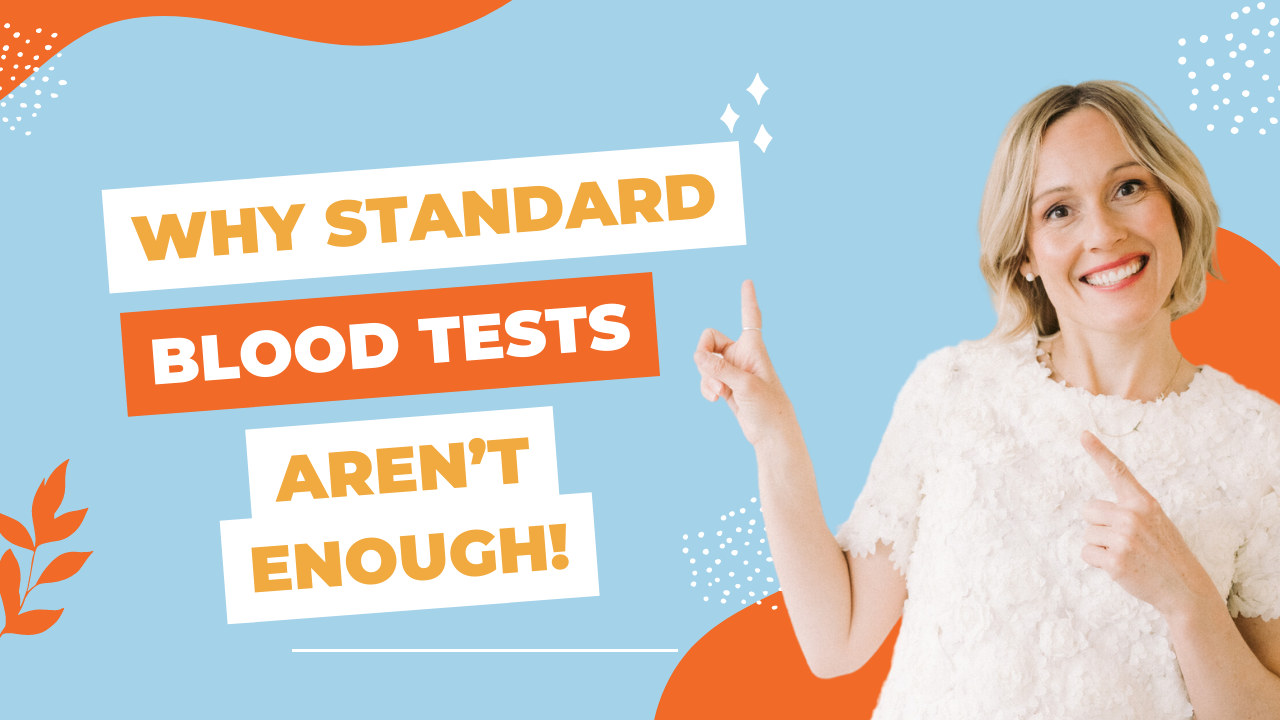Why Standard Blood Tests Aren’t Enough
Ever felt like you’re wading through a never-ending fog of fatigue, even after a full night’s sleep? Discover how a simple blood test can unravel the mysteries of your exhaustion and chart a path to improving your mitochondria and reclaiming your vitality. Let’s Dive in and learn how you can turn weariness, weakness, brain fog, lower mood, into strength, energy, clarity, radiant vitality.
Blood Tests are A Window into Our Highest Health:
Hi, I’m Dr. Tara Campbell, naturopathic doctor. Every day, I encounter patients who are burdened by the fog of fatigue, their vibrant selves muted by persistent exhaustion. I deeply empathize with this struggle, understanding how it can cloud every aspect of life.
So, what if I told you that a few drops of your blood could provide a window into the hidden intricacies of your health? Blood markers are like whispered secrets from our body, offering clues about what might be amiss.
These markers aren’t just abstract numbers; they’re deeply personal storytellers, revealing invaluable information about our physiological well-being. By examining these markers, we can derive objective, data-driven insights, cutting through the ambiguity and shining a light on the root causes of your fatigue.
This isn’t just about diagnosing; it’s about understanding, connecting, and embarking on a journey towards genuine health restoration.
Common Blood Tests Relevant to Low Energy:
In my practice, I’ve seen countless patients who, despite their best efforts, grapple with an energy crisis. While fatigue’s origin can be multifaceted, there are some usual suspects that our body’s blood markers often reveal. Let me guide you through some of these critical blood test indicators.
Thyroid Imbalances: Consider your thyroid gland as the director of your body’s rhythm, energy, stress response and metabolism. It’s a small, butterfly-shaped gland at the front of your neck, but its impact is profound. When the thyroid isn’t functioning optimally, you may feel the weight of fatigue, irrespective of your sleep or diet. Both overactivity (hyperthyroidism) and underactivity (hypothyroidism) can disrupt your energy levels, making regular checks of markers such as TSH, Free T3, Free T4 and thyroid antibodies indispensable.
Nutrient Deficiencies: It’s distressing to think that despite our best dietary efforts, our body might be starved of essential nutrients. Iron, for instance, plays a vital role in oxygen transport; a deficiency can leave you feeling constantly weary – and it’s important to look at both ferritin, TIBC and iron.
Vitamin B12, a vital cog in our energy production machinery, when lacking, can be a hidden culprit behind fatigue.
Vitamin D, often termed the ‘sunshine vitamin,’ is vital for bone health and immune function; as well as a profound impact on our mood and vitality. Deficiency is far too common…even in summer months.
Lastly, magnesium is like the body’s spark plug, critical for over 300 enzymatic reactions, including those related to energy. A lack of it can result in fatigue, sleep challenges and muscle cramps.
Inflammation: Prolonged inflammation can be likened to a smoldering fire within the body. Markers like CRP and ESR provide insights into this internal inflammatory state. Chronic inflammation can tax the body’s resources, leading to pervasive fatigue. CRP is reflective of acute inflammation and ESR of more chronic and systemic inflammation.
Blood Sugar Regulation: The body’s energy currency is glucose. However, too much or too little can destabilize our energy equilibrium. HbA1c offers a window into our average blood sugar levels over months, highlighting potential disruptions in energy metabolism. However, the real winning assessment of blood sugar, energy and metabolism is fasting insulin. This is your warning marker and can be addressed BEFORE you see issues with fasting glucose and HbA1c.
Adrenal Health: Sitting on top of our kidneys; the adrenal glands produce cortisol, and hormones – estradiol, progesterone, DHEA, testosterone, and more. Cortisol, your ‘stress hormone’ – while essential in acute stress responses, prolonged high levels can sap our vitality, leaving us drained. Monitoring cortisol can provide insights into how our body’s stress response might be influencing our energy reservoirs. Of course, it’s also key to look at your hormones and optimal ranges per age.
In essence, these markers, when observed holistically, weave a story of our internal health, guiding us towards the root causes of fatigue and paving the way for personalized, effective interventions.
Beyond Standard Blood Tests:
Navigating the world of health and wellness, I often find myself emphasizing that not all blood tests are created equal. While standard panels give us a foundational understanding, sometimes, we need to delve deeper to truly unravel the mysteries of persistent fatigue. This is where naturopathic medicine shines its transformative light.
Naturopathic medicine isn’t just about diagnosing. It’s a holistic approach, focusing on the interconnectedness of our systems. Instead of treating individual symptoms in isolation, it seeks to understand the underlying causes and their intricate web of interactions. Such a perspective often requires a more in-depth diagnostic lens.
One such specialized tool is the Organic Acids Test (OAT). Think of OAT as a deep dive into your cellular health. By analyzing specific compounds in the urine, it offers a snapshot of our metabolic processes, shedding light on areas like energy production, detoxification, neurotransmitter levels, and even gut health. For someone grappling with unexplained fatigue, these insights can be revolutionary. By pinpointing metabolic hiccups, OAT guides tailored interventions, ensuring that we’re not just placing a band-aid but genuinely addressing the root.
Embracing naturopathic medicine and its advanced tests like OAT allows us to journey beyond the surface, providing a comprehensive roadmap to reclaiming vitality and zest for life.
Moving Forward:
Navigating the path to vibrant health can sometimes feel like charting unknown territories. But armed with knowledge and proactive steps, we can illuminate this journey with clarity and purpose.
Firstly, the frequency of blood tests is contingent on individual needs. For those newly uncovering the root causes of their fatigue, a quarterly assessment might be advantageous, ensuring that interventions are on track, monitored effectively and showing improvement.
Once a stable health baseline is established, semi-annual or annual tests can suffice. However, always remember: if you experience a noticeable change in how you feel, it warrants a check. Listen to your body; it whispers before it screams.
Secondly, it’s paramount to align with healthcare professionals who view fatigue not as a mere symptom but a complex puzzle. A practitioner who delves into the intricacies, asks the right questions, and genuinely listens is invaluable. Their expertise should not only encompass the science of blood markers but the art of holistic care.
Lastly, I cannot emphasize enough the power of self-advocacy. Your health is your story, and you are its primary author. If something feels off, trust that intuition. Seek out comprehensive testing and persistently ask questions until you find answers that resonate. While the healthcare system can sometimes be labyrinthine, remember: your well-being is worth every effort, every question, and every pursuit.
May your journey forward be marked not just by the absence of fatigue, but the vibrant presence of energy, zest, passion for life and purpose.
Final Thoughts:
I urge you to take a proactive step: schedule a blood test or seek a consultation with a functional medicine practitioner. We offer a free consultation to help you decide which blood markers would be best for you.
Should we end up working together, we aim to discern the underlying intricacies of your health and develop a tailored strategy. Prioritize your well-being and collaborate with professionals who understand its depth and nuances. Schedule your free consultation today.
Book your free consultation today!
Resources:
- Thyroid Disorders & Fatigue
- Garber, J. R., Cobin, R. H., Gharib, H., Hennessey, J. V., Klein, I., Mechanick, J. I., … & Woeber, K. A. (2012). Clinical practice guidelines for hypothyroidism in adults: cosponsored by the American Association of Clinical Endocrinologists and the American Thyroid Association. Endocrine Practice, 18(6), 988-1028.
- Nutrient Deficiencies & Energy
- Blood Sugar & Energy Balance
- Adrenal Health
- Organic Acids Test (OAT) & Its Relevance
- Naturopathic Approaches to Fatigue






